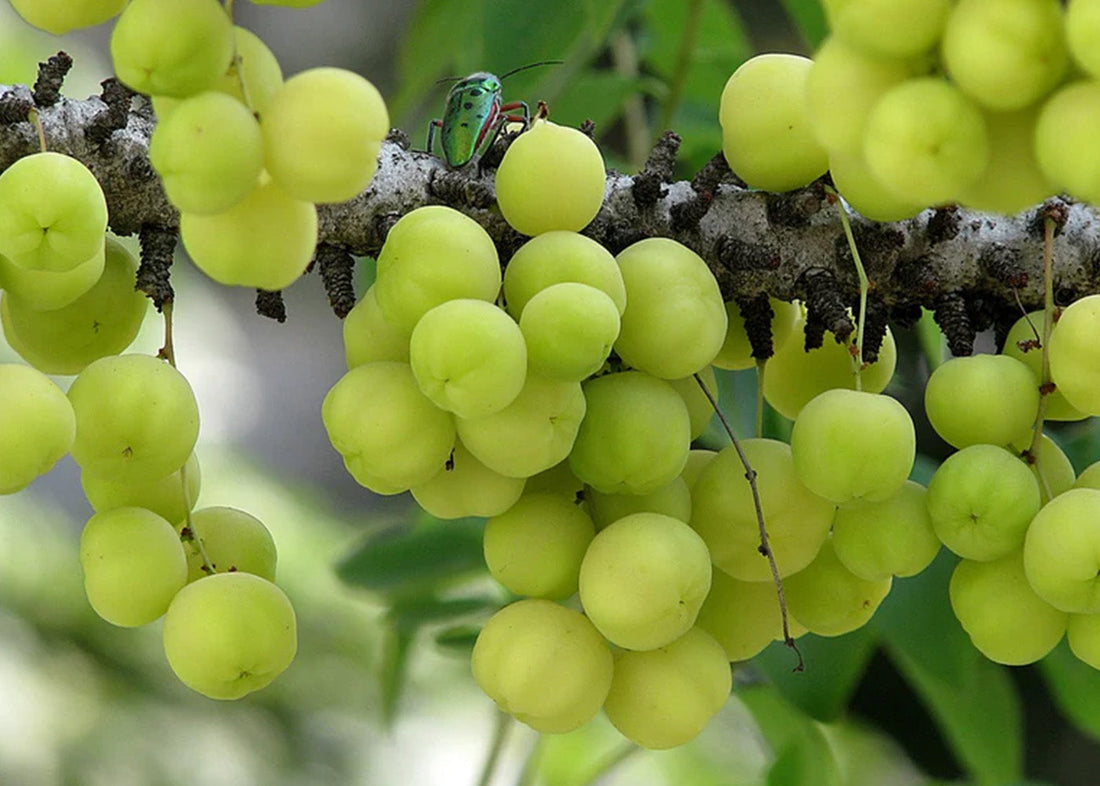By Brian Keenan
Amla fruit, also known as Indian Gooseberry and scientifically named Phyllanthus emblica (formerly Emblica officinalis) is a plant of extraordinary importance in the Indian culture and plays a pivotal role in health and longevity. The reverence this tree commands is indicated by the mythology surrounding the tree and the multitude of scientific inquiries that have been launched into this superfood. In mythology it is said that during a quarrel amongst the Gods, a fluid called Amrita, which has been translated as both “heavenly nectar” and “the elixir of life”, spilled upon the earth, whereupon the Amla tree began to sprout[1]. Moreover, in the Hindu calendar, there is a celebration called Amla Navami, a holiday between October and November, where the Amla tree, its fruit, and all the medicinal gifts it provides, is celebrated. Meanwhile, research continues to refine and assess just how many gifts it provides as a medicinal food. A simple pub-med search of Amla, or its two previously mentioned scientific names yields over, 1000 clinical studies and phytochemical analyses. The diversity of research into Amla mirrors the diversity of its traditional applications. It has been used, and is still used today, for aid in respiratory conditions, cardiovascular support, preventing neoplasms, assisting metabolic and endocrine functions, sexual health, and for supporting healthy and complete digestion[2]. With so many documented functions, it begs the question if it truly did spring out of a magical elixir.
How this panacea exerts its effects, like virtually all other plant medicines, is multifactorial and the symphonic effect of multiple constituents is what allows it to have so many useful functions in the body. The most popular and noted of Amla’s biochemical activities is through its effects as a potent antioxidant. Polyphenols such as the hydrolysable tannins phyllemblin, emlicol, and emblicanin all have been studied for their effects as potent dietary antioxidants. Phyllemblin is also known as ethyl gallate, is now manufactured and used as an additive in commercial foods for its antioxidant properties[3]. Also adding to the antioxidant power of Amla is its content of vitamin C (ascorbic acid). After Barbados cherry, Amla is second richest natural source of vitamin C having approximately 600 to 700 mg per fruit [4]. This combination of diverse antioxidants are what is currently being studied for Amla’s role in supporting healthy blood sugars, mitigating the severity of dyslipidemia, and decreased inflammation in those with chronic digestive tract inflammation[5]. Moreover, Alma has been further studied and found to be spasmolytic to the digestive tract, though the chemical or chemicals responsible for this effect are still being investigated[6].
Additional research into Amla has supported its role in cardiovascular health. Amla seems to support cardiovascular health in two primary mechanisms. First, through dietary antioxidants already discussed and their known effects supporting vasculature at the capillary level; and the second, through improving liver function and ameliorating dyslipidemia, both of which contribute directly to long term cardiovascular health[7]. A clinical trial of obese patients found after 12 weeks of supplementation of 500mg of Amla extract, there was a decrease in LDL cholesterol, platelet aggregation, and Hs-CRP levels[8]. This combination of phytochemical study and clinical application are continuing to validate this plant’s long held title as a true whole body aid.
As Amla research continues to grow and support the utility of this plant in our overall health, we can see it come of particular use to individuals for whom digestion and absorption are suboptimal. Through its use as an antioxidant and digestive, it works well as a unique envoy between the digestive and absorptive processes of the body and the metabolism and utilization of the nutrients absorbed. Its antioxidants function to dampen down any inflammation that compromises either GI tract itself or its microbiome[9], which ensures that which we bring in from the outside through the diet, is able to be utilized by the body for the greatest good. With its symphony of actions owing to its harmony of chemical constituents, it’s no wonder great songs are sung about this fruit that may have indeed sprouted from the elixir of life.
[1} https://www.easyayurveda.com/2013/01/17/amla-benefits-dose-usage-side-effects-complete-ayurveda-details/#amla_pooja_(worship)
[2] Sodhi, V. (2014). Ayurvedic herbs: The comprehensive resource for ayurvedic healing solutions. Bothell, WA: Book Network.
[3] Krishnaveni, M., & Mirunalini, S. (2010). Therapeutic potential of Phyllanthus emblica (amla): the ayurvedic wonder. Journal of basic and clinical physiology and pharmacology, 21(1), 93–105.
[4] Goraya, R. K., & Bajwa, U. (2015). Enhancing the functional properties and nutritional quality of ice cream with processed amla (Indian gooseberry). Journal of food science and technology, 52(12), 7861–7871.
[5] Manjunathatha S, Jaryal AK, Bijlani RL, Sachdeva U, Gupta SK. Effect of Chyawanprash and vitamin C on glucose intolerance and lipoprotein profile. Indian J Physiol Pharmacol 2001;45:71-9.
[6] Mehmood, M. H., Siddiqi, H. S., & Gilani, A. H. (2011). The antidiarrheal and spasmolytic activities of Phyllanthus emblica are mediated through dual blockade of muscarinic receptors and Ca2+ channels. Journal of ethnopharmacology, 133(2), 856–865.
[7] Patil, B. S., Kanthe, P. S., Reddy, C. R., & Das, K. K. (2019). Emblica officinalis (Amla) Ameliorates High-Fat Diet Induced Alteration of Cardiovascular Pathophysiology. Cardiovascular & hematological agents in medicinal chemistry, 17(1), 52–63.
[8] Khanna, S., Das, A., Spieldenner, J., Rink, C., & Roy, S. (2015). Supplementation of a standardized extract from Phyllanthus emblica improves cardiovascular risk factors and platelet aggregation in overweight/class-1 obese adults. Journal of medicinal food, 18(4), 415–420.
[9] Kapoor, M. P., Suzuki, K., Derek, T., Ozeki, M., & Okubo, T. (2019). Clinical evaluation of Emblica Officinalis Gatertn (Amla) in healthy human subjects: Health benefits and safety results from a randomized, double-blind, crossover placebo-controlled study. Contemporary clinical trials communications, 17, 100499.

